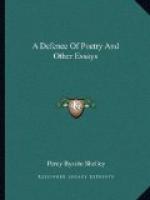To attain an apprehension of the importance of this distinction, let us visit, in imagination, the proceedings of some metropolis. Consider the multitude of human beings who inhabit it, and survey, in thought, the actions of the several classes into which they are divided. Their obvious actions are apparently uniform: the stability of human society seems to be maintained sufficiently by the uniformity of the conduct of its members, both with regard to themselves, and with regard to others. The labourer arises at a certain hour, and applies himself to the task enjoined him. The functionaries of government and law are regularly employed in their offices and courts. The trader holds a train of conduct from which he never deviates. The ministers of religion employ an accustomed language, and maintain a decent and equable regard. The army is drawn forth, the motions of every soldier are such as they were expected to be; the general commands, and his words are echoed from troop to troop. The domestic actions of men are, for the most part, undistinguishable one from the other, at a superficial glance. The actions which are classed under the general appellation of marriage, education, friendship, &c., are perpetually going on, and to a superficial glance, are similar one to the other.
But, if we would see the truth of things, they must be stripped of this fallacious appearance of uniformity. In truth, no one action has, when considered in its whole extent, any essential resemblance with any other. Each individual, who composes the vast multitude which we have been contemplating, has a peculiar frame of mind, which, whilst the features of the great mass of his actions remain uniform, impresses the minuter lineaments with its peculiar hues. Thus, whilst his life, as a whole, is like the lives of other men, in detail, it is most unlike; and the more subdivided the actions become; that is, the more they enter into that class which have a vital influence on the happiness of others and his own, so much the more are they distinct from those of other men.
Those little,
nameless, unremembered acts
Of
kindness and of love,
as well as those deadly outrages which are inflicted by a look, a word—or less—the very refraining from some faint and most evanescent expression of countenance; these flow from a profounder source than the series of our habitual conduct, which, it has been already said, derives its origin from without. These are the actions, and such as these, which make human life what it is, and are the fountains of all the good and evil with which its entire surface is so widely and impartially overspread; and though they are called minute, they are called so in compliance with the blindness of those who cannot estimate their importance. It is in the due appreciating the general effects of their peculiarities, and in cultivating the habit of acquiring decisive knowledge respecting the tendencies arising out of them in particular cases, that the most important part of moral science consists. The deepest abyss of these vast and multitudinous caverns, it is necessary that we should visit.




